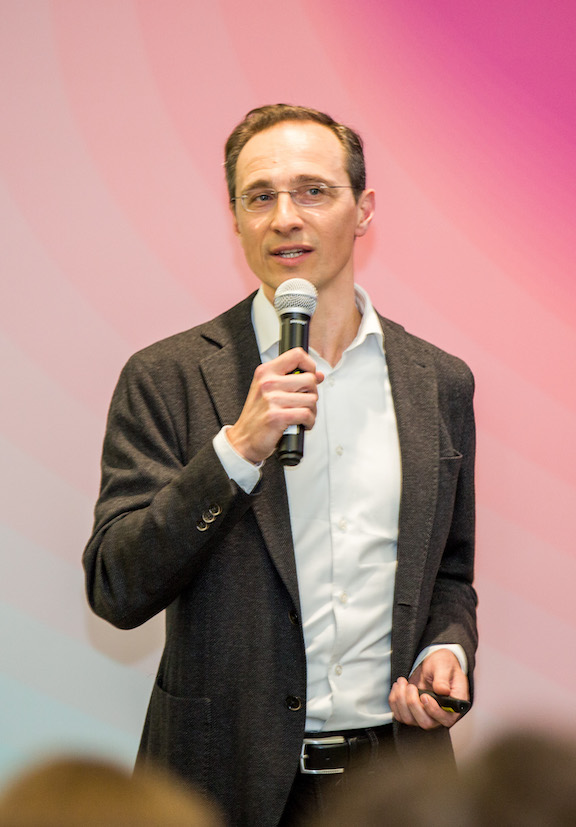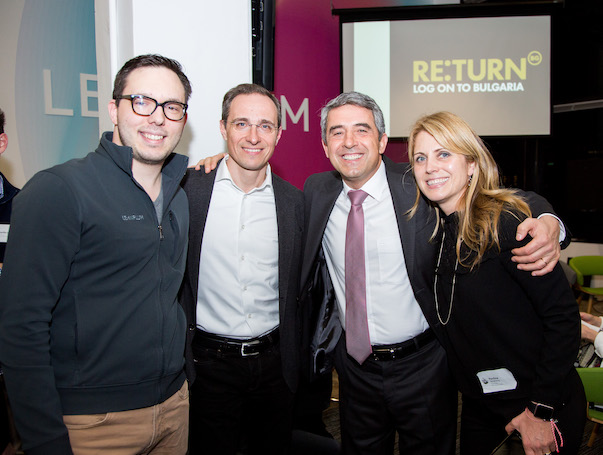 Bulgaria, 2010. You have a good business idea and need funding to develop it. Unfortunately, you don’t have many options: you can either mortgage the family home or borrow from friends. State and European Union subsidies are only available in certain fields, and there are so few private investors in the country at the time that the chances of crossing paths with one are minimal.
Bulgaria, 2010. You have a good business idea and need funding to develop it. Unfortunately, you don’t have many options: you can either mortgage the family home or borrow from friends. State and European Union subsidies are only available in certain fields, and there are so few private investors in the country at the time that the chances of crossing paths with one are minimal.
Things look very different in the Bulgaria of 2019, thanks in large part to the efforts of Evgeny Angelov and the introduction of alternative financing sources for business between 2010 and 2011. At that time, Evgeny was deputy economy minister and one of the chief architects of the first Bulgarian funds for venture capital and debt financing. Thanks to these funds, financed through a mix of EU and private investment, Bulgarian startups could tap into 350 million euros’ worth of seed money for their activities as early as 2011.
Today Bulgaria has eight active funds, more than 250 investments, and far more considerable investment resources. “If you are a company with a good idea regardless of your development stage, it is almost impossible not to get funding in Bulgaria today,” Evgeny says.
Promoting entrepreneurship and competition was a cornerstone of his activities as deputy economy minister and later as economic adviser to Bulgarian President Rosen Plevneliev (2012–2017). Evgeny was an initiator and board member of Sofia Tech Park, a public incubator for scientific and technological innovation. As deputy minister, he helped reduce the size of the economy ministry’s administration and increase its efficiency. Evgeny also supervised more than fifty state enterprises, some of which were closed down, and others restructured.
Not all innovations were popular, and some met with resistance, but Evgeny is used to making difficult decisions and managing change. At the age of 16, when most of his peers were just starting to think about what they wanted to do in life, he enrolled at university in England. At 19, he graduated and started working for a major office building developer in London. At age 20, he became the youngest analyst at the European Bank for Reconstruction and Development in London, and a year later its youngest associate. After earning an MBA from Harvard Business School in 2005—at a time when many Bulgarians still preferred to try their luck abroad—Evgeny returned to Bulgaria to head the regional branch of Trigranit Development Corporation, a leading real estate company in Central and Eastern Europe.
Evgeny continues to be an important presence in the world of investment. He is a partner at Postscriptum Ventures, an investment fund helping energy companies develop innovative solutions for renewable energy generation, and chairman of the Bulgarian Private Equity and Venture Capital Association (BVCA). The Association is a meeting place of investors and entrepreneurs working to improve the business environment and foster innovation in the country.
At a series of events throughout 2017 and 2018, BVCA members met with Bulgarians in several European cities and talked to them about the many investment and entrepreneurship opportunities Bulgaria offers. These meetings and the partnership of the America for Bulgaria Foundation gave rise to RE:TURN, a large-scale attempt to establish closer connections between Bulgaria and Bulgarians abroad. In early March 2019, the RE:TURN organizers and partners from the private sector visited three cities on the US West Coast, where they met with over 450 Bulgarians and friends of Bulgaria.
In this interview for ABF’s monthly newsletter, Evgeny talks about Bulgaria’s investment scene, the lessons of RE:TURN, and the country’s economic prospects.
Most Bulgarians returning from abroad prefer to work in the private sector. Why did you choose a public-sector job?
This was an opportunity that found me; I wasn’t looking for it. I could have declined it and continued to complain from the sidelines, the way I used to do. Maybe my decision then was a bit naive, but I do not regret taking the opportunity. I took the job believing that things could be improved and that quality people could be attracted to public service. By the way, there are some really honest, hardworking people in public administration who are doing a great deal, but nobody notices their work.
You will be subjected to all kinds of attacks in government work. It happens every day to all kinds of people, but this job is still extremely important. People in government play a huge role in our lives, so decisions at this level should be taken by competent individuals. Nothing will ever change if we don’t have quality people in the most important places.
 As deputy minister of the economy (2009–2012), you helped set up the first alternative financing instruments for Bulgarian business. Although a lot of the funds came from the EU, you and a handful of others insisted on attracting private funding as well. Why?
As deputy minister of the economy (2009–2012), you helped set up the first alternative financing instruments for Bulgarian business. Although a lot of the funds came from the EU, you and a handful of others insisted on attracting private funding as well. Why?
EU funds are a huge opportunity for Bulgaria, but you can’t finance innovation only through grants. It just doesn’t work. On the other hand, VC financing for new products, business models, and services has been proven to work all around the world. Grants aren’t very flexible. They are intended for specific purposes, while companies are dynamic. They need different resources for different things; their needs change from month to month, year to year. They need money now to get started, not in a year and a half.
At the time, I was adamant that we should get some of this grant funding and start a local infrastructure for financing companies that is not time dependent. We wanted to lay its foundations, so it could replicate itself and grow. We decided to set up four or five funds to cover all the development stages of a company.
The other important aspect was that this resource had to be managed not by a state structure, but by someone who knew how to choose fund managers and how to monitor them. State administrators did not have this set of skills.
Some investment funds started with 100% EU funding, others with 70%, and still others with 50% funding from the EU, and now a large part of the funds are privately funded. There is some revolving financing that has come back from the first wave of funds and is entering the new wave. You make investments in or give loans to companies, they return them, and this money becomes part of the financing for a new fund.
This industry cannot be launched without a “nudge” from the government. All funding ecosystems, including the one in the US, have started this way. It’s just too risky, there’s no history, and it’s very hard to get started. But the groundwork here has been laid, and this is a huge competitive advantage for Bulgaria. One-third of the companies that get funding from the Bulgarian funds are not Bulgarian (but they are required to have a significant presence in Bulgaria). Bulgaria has to brand itself as the Sand Hill Road of Southeast Europe. If you are a company and have a good idea in this region and want to expand into bigger markets, Bulgaria is the place to get funding.
What is the logic of local funding, and why do we need competing funds?
Financing startups is a very local business. An American fund will never invest 50,000 euros in a company in Bulgaria, for example. This can only happen if the company is really big, but companies that need 50,000 to 2–3 million euros have to partner with local funds.
Competition between funds, even in a smaller market, is extremely important. This way a company has a choice, and instead of three or four people, there are currently 20 to 25 partners and investors working in this area. I think that’s why it worked out in Bulgaria. There is a critical mass of hardworking, competent people who are competing with one another.
 What is BVCA’s role in this system?
What is BVCA’s role in this system?
After the first funds were set up, it became clear that we needed a unifying entity to deal with things that are not within the competence of individual funds. BVCA communicates with government institutions on issues related to regulations and investment.
BVCA represents all funds at events in Bulgaria and abroad. Three years ago, we launched an initiative involving meetings with Bulgarians in European capitals, where fund managers and entrepreneurs talk about what is happening in Bulgaria. We want to provide the necessary information to Bulgarians living abroad who want to invest in a company or a fund or want to work for one of the companies in the funds’ portfolios. These meetings became the largest gatherings of Bulgarians anywhere abroad, on any occasion.
At one point, we decided to broaden the scope of the initiative, and that’s how we started working with ABF. The product of this cooperation was RE:TURN. In addition to informing people about investment and work opportunities, the initiative highlights the importance of giving back to their country. There is now a platform offering all these opportunities to Bulgarian expats who want to engage with their birthplace, be it by donating 50 dollars to a cause or by investing 500,000 dollars in a business, or by returning to work here. We want to be a meeting place of the organizations making a difference and be a gateway to all the great things that are happening in Bulgaria.
What does the Bulgarian economy need to develop successfully over the next five years?
One pressing need is people—from highly skilled to low-skilled workers. This is the logical consequence of the demographic decline in Bulgaria, which is felt even more acutely right now because the economy is doing really well. We must attract quality immigration to Bulgaria—young, working-age people who want to contribute to everyone’s well-being. This would be good both for the population and for business. It is in our interest to find the mechanisms to make this happen. Otherwise, businesses will simply leave.
We have to make Bulgaria attractive for people, especially for the 2.5 million Bulgarians who live abroad. The state’s main responsibility is to offer good-quality healthcare, education, and security. It is also important that regulators deal with unfair competition. They must function professionally and apolitically. It is also necessary to reduce the red tape, for example by introducing e-government services, which will save people millions of hours of work and eliminate corruption at the lower levels.

